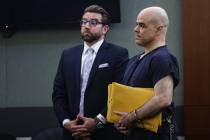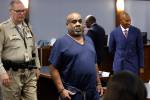Excessive force case at detention center under investigation
The FBI and the Justice Department’s Civil Rights Division in Washington are investigating allegations of excessive force by a corrections officer more than four years ago at the now-closed North Las Vegas Detention Center.
The investigation, which focuses on an alleged Nov. 29, 2008, assault of a federal inmate housed at the detention center, has led to a dispute between the Justice Department and the North Las Vegas Police Department and a closed hearing before a federal judge last week.
Last month, the North Las Vegas City Attorney’s Office criticized the investigation in court papers seeking to quash grand jury subpoenas for internal Police Department documents.
“The United States is simply attempting to conduct a fishing expedition to see what they might uncover,” Deputy City Attorney Claudia Aguayo wrote. “Such an attempt cannot be permitted.”
The inmate, 51-year-old Doyle Hedger, filed a civil rights lawsuit in 2010 alleging corrections officer Stuart Johnson body slammed him to the ground while he was handcuffed, giving him serious head lacerations when he hit the concrete floor. Johnson, North Las Vegas and the detention center all were named as defendants.
At the time of the altercation, which was captured on jailhouse videotape, Hedger was in federal custody at the detention center following his arrest for violating the terms of supervised release on a felony firearms conviction.
The U.S. Marshals Service had long contracted to house prisoners facing federal charges at the North Las Vegas Detention Center, which shut its doors in July 2012 in a city cost-cutting move.
Several months after filing his lawsuit, Hedger struck an agreement with North Las Vegas to settle his claims for just under $50,000. Hedger, who has a lengthy criminal history, is now serving time on drug charges in the Nevada prison system.
Attorney Peter Goldstein, who filed the suit on Hedger’s behalf, said he has not been contacted by the Justice Department and has not heard from Hedger since the case settled.
But Johnson’s lawyer, Jeffery Allen, said that he is aware of the federal investigation and that it is “preposterous” to think Johnson used excessive force on Hedger.
Allen, general counsel for the North Las Vegas Police Officers Association, said Johnson conducted himself in a lawful manner while having to deal with an agitated inmate who was not complying with an order.
And it was Johnson who called for medical attention after Hedger hit the ground, Allen said.
The North Las Vegas Police Department fired Johnson in March 2009. More than a year later, however, an arbitrator overturned the dismissal, and in September 2010 a district judge denied the city’s bid to vacate the arbitrator’s decision.
“He was found to have done absolutely nothing wrong by an independent arbitrator and a district judge,” Allen said.
Johnson was reinstated in 2010 and continued to work at the detention center until he was laid off in July when the facility closed.
Allen said the Justice Department has been looking at the confrontation between Johnson and Hedger for at least the past two years.
In court papers, Aguayo said the Police Department became concerned after it received a series of grand jury subpoenas from the FBI this year requesting internal investigative reports and documents prosecutors contended were relevant to the civil rights investigation.
She said the department turned over internal affairs reports on the alleged assault of Hedger, but was fighting subpoenas seeking internal reports on four other corrections officers the government considers witnesses in the investigation. The Police Department also was fighting to withhold from the government a “confidential police procedure manual” used by the detention center.
“This case is not as simple as a grand jury subpoenaing an alleged law-breaker,” Aguayo wrote. “Rather, it reflects a tension between two law enforcement interests.”
A Jan. 15 grand jury subpoena sought police documents on “any allegations of misconduct or findings of untruthfulness” involving the four officers.
Among the four was Hollis Salahuddin, who was arrested in October 2009 and charged with trying to help an inmate escape. Those charges were later dismissed, but Salahuddin was fired from the detention center in April 2010, records show.
Allen said Salahuddin did not see the confrontation between Johnson and Hedger, and arrived on the scene after it happened as medical attention was being sought for Hedger.
According to Aguayo, the Police Department told the Justice Department it had no reports of alleged misconduct by the other three corrections officers and had nothing to turn over to the government.
The Police Department, she said, investigated Salahuddin but was unwilling to give up its internal reports on her, arguing it would intrude on her privacy and Fifth Amendment rights. Aguayo contended Salahuddin had nothing to do with the encounter between Hedger and Johnson and there was no reason to provide information about her to the government.
Aguayo also argued that turning over the records could harm the department’s ability to conduct future internal affairs investigations.
Police officers tend to “place solidarity above all else” and are “less than cooperative” in investigations of fellow officers, she said.
“The confidentiality of internal investigations is therefore essential,” Aguayo explained. “Handing internal affairs investigations over to an outside party or agency, including one involved in criminal investigations, would be perceived by cooperating officers as a serious compromise of confidentiality.”
Aguayo said the Police Department also was reluctant to turn over its police procedure manual, which was described as a “playbook” that contains “sensitive information regarding the investigative methodology of the police department.”
Police worried that the playbook could wind up in the wrong hands, especially criminal defendants, she wrote.
Civil Rights Division prosecutors filed a response under seal.
Last week, U.S. Magistrate Judge George Foley Jr. held a hearing on the city’s motion to quash the grand jury subpoenas, but he barred a reporter from attending because it involved secret proceedings before the grand jury.
Aguayo and two trial lawyers with the Criminal Section of the Civil Rights Division, Patricia Sumner and Ryan Murguia, were on hand for the closed hearing.
According to the court docket in the case, the judge discussed the motion to quash with the lawyers, but there was no mention whether the issue was resolved.
North Las Vegas officials declined to comment on the investigation, citing grand jury secrecy, and the Civil Rights Division did not respond to requests for comment.
Contact Jeff German at jgerman@reviewjournal.com or 702-380-8135. Follow @JGermanRJ on Twitter.























